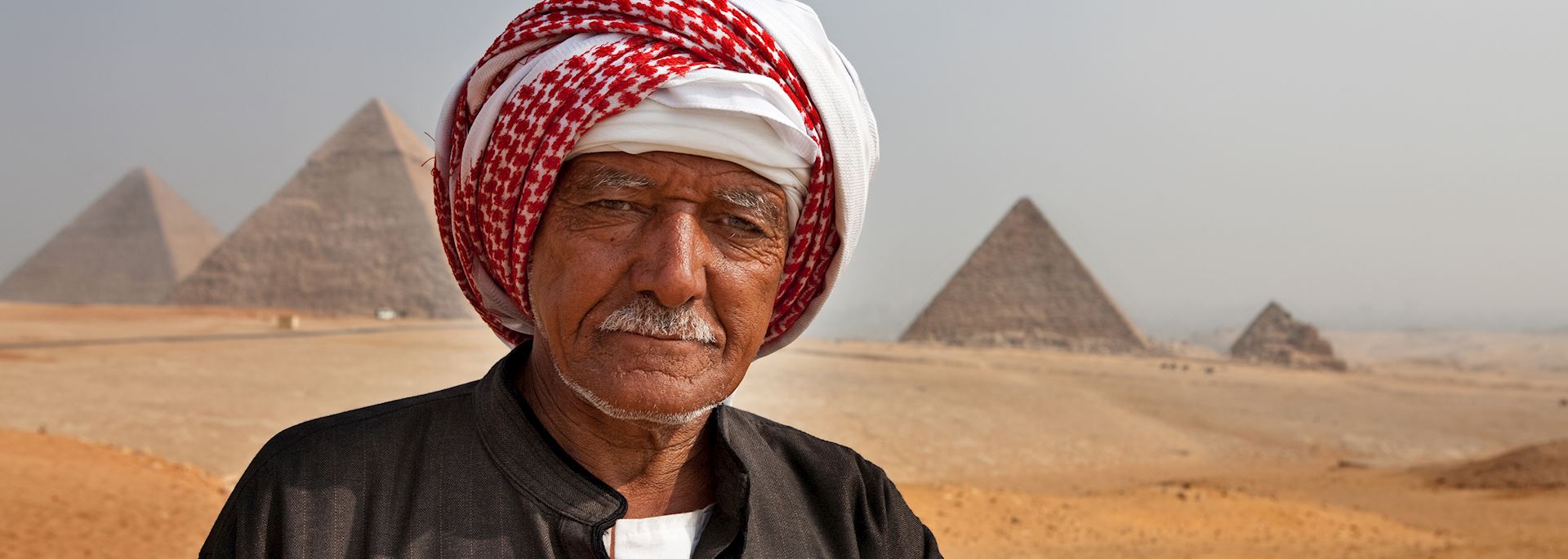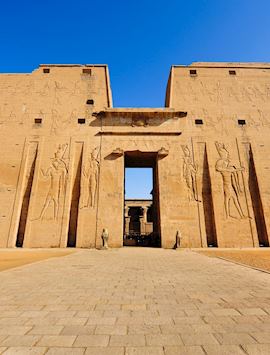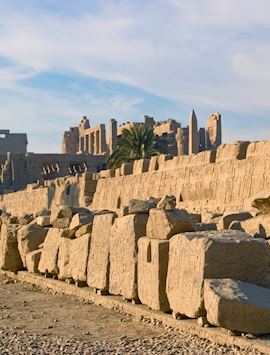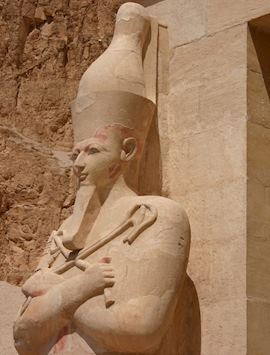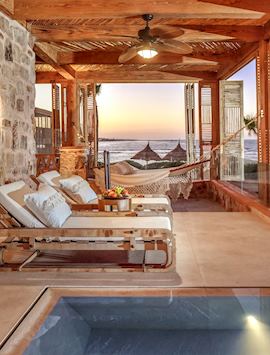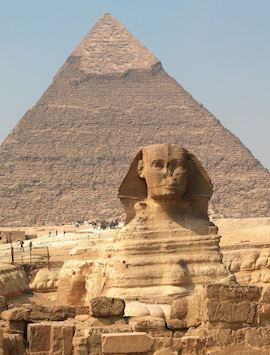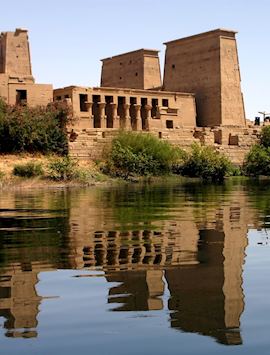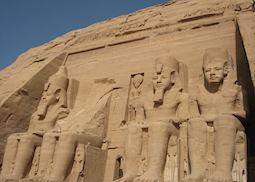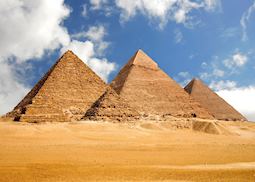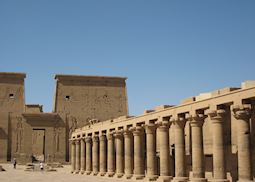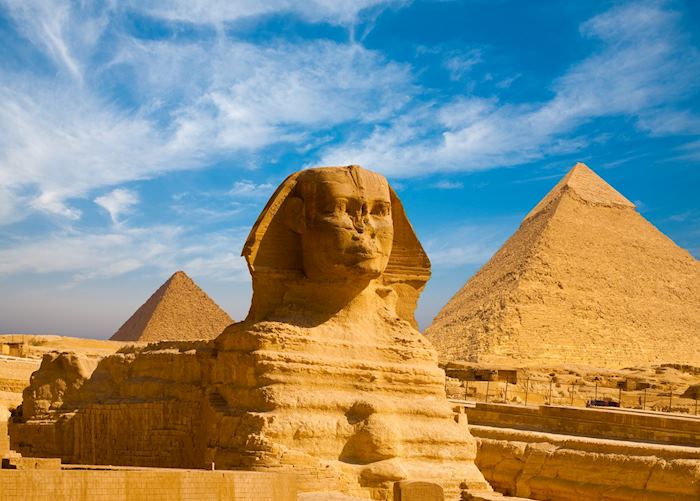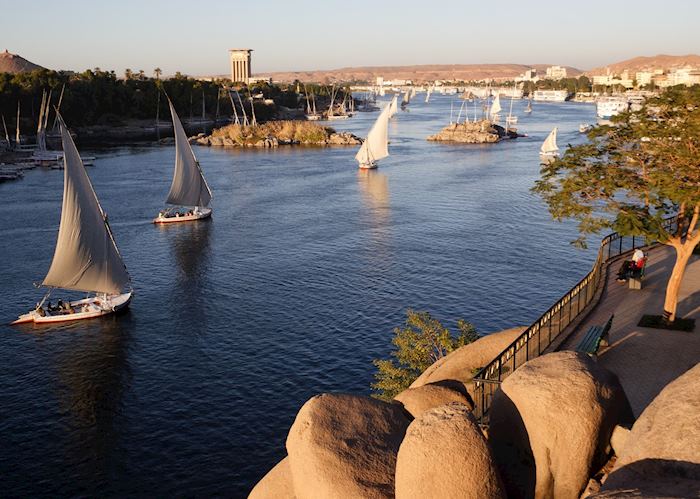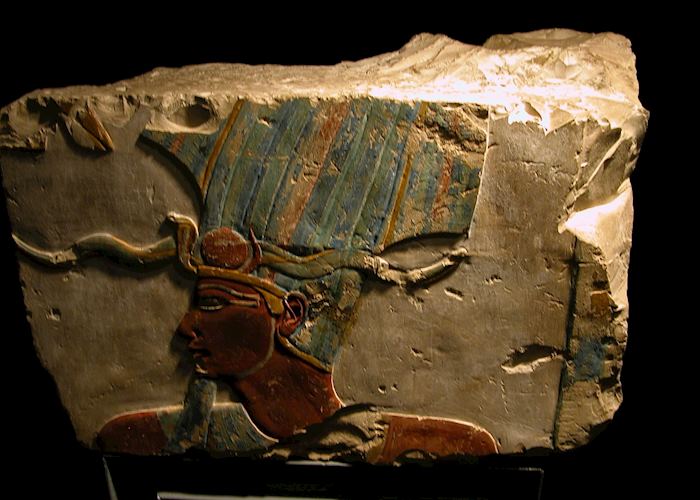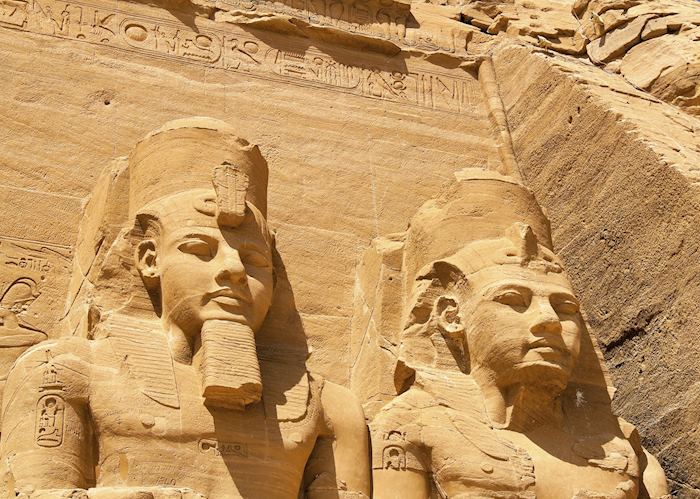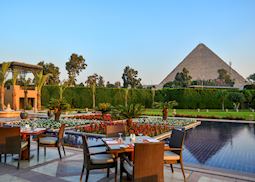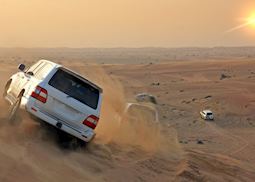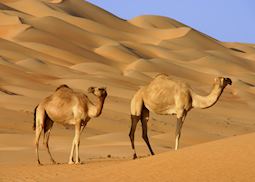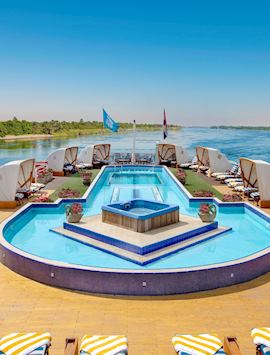
Pyramids rise above sun-baked sands. The Sphinx stares, unblinking, into a relentlessly blue sky. Boats wend their way down the waters of the Nile. Traders hawk their wares in the dusty bazaars. In many ways, Egypt seems timeless, unchanging. However, modern politics are very present in this ancient land and our specialists continue to visit Egypt to gauge the atmosphere and levels of service available throughout the country.
In our experience it remains a friendly and hospitable place, and our experts can craft a tailored itinerary to help you explore this dynamic destination. A cruise down the Nile is still one of the most effective ways to see Egypt, including the archaeological treasures around Aswan and Luxor. But there is more to see on an Egypt holiday than the ancient sites — coral reefs in the clear waters of the Red Sea, afternoon tea at the Victorian-era Old Cataract Hotel, medieval sites in the souqs of Cairo.
Suggested tours for Egypt
Cruise the Nile in a traditional dahabiyya, take a private tour of the Temple of Karnak in Luxor, and explore the Bent Pyramid at Dahshur. Our suggested itineraries are a great starting point as you begin to plan your trip to Egypt.
Suggested activities for Egypt
Explore the tombs on the West Bank of Luxor on a private tour, walk through the temples at Abu Simbel, and visit the pyramids at Giza, Saqqara, and Dahshur. Whatever your interests, our specialists will suggest experiences designed to enhance your trip to Egypt.
-
Abu Simbel tour ![Abu Simbel, Egypt]()
Abu Simbel tour
AswanAbu Simbel tour
The great Sun Temple of Abu Simbel epitomises the monumentalism of the New Kingdom during its imperial heyday, when Ramses II waged colonial wars from the Bekaa Valley in Lebanon to the Fourth Cataract.
View details -
Giza, Saqqara & Dahshur ![The Pyramids of Giza]()
Giza, Saqqara & Dahshur
CairoGiza, Saqqara & Dahshur
As the only survivor of the Seven Wonders of the Ancient World, the pyramids at Giza occupy a unique place in world history, and are a perennial favourite with travellers.
View details -
Philae Temple excursion ![Philae Temple]()
Philae Temple excursion
AswanPhilae Temple excursion
Take a short boat ride before disembarking into a colonnaded courtyard, which will lead you into Philae Temple itself, flanked by wonderfully carved pylons.
View details
Why travel with Audley?
- 100% tailor-made tours
- Fully protected travel
- Established for over 25 years
- 98% of our clients would recommend us
Best time to visit
Our specialists advise on the best months to visit Egypt, including information about climate, events and festivals.
Request our brochure
Covering all seven continents, The World Your Way shows you how you can see the world with us. It features trip ideas from our specialists alongside hand-picked stays and experiences, and introduces our approach to creating meaningful travel experiences.
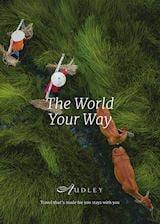
Useful information for planning your holiday in Egypt
Modern Standard Arabic is the official language of Egypt. However, you’ll mostly hear people speaking the Egyptian dialect, a colloquial variety of Modern Standard Arabic that has some different words and pronunciation. While people in other Arab countries speak different varieties of Arabic, Egyptian Arabic is widely understood because Egyptian cinema and soap operas are popular across the region.
That said, all of the guides we pair you with can speak English to varying degrees, and you should be able to communicate with drivers, market stall vendors, and other service workers in larger cities and towns. However, in Upper Egypt, away from the main visitor sites, souqs, and hotels, people might not speak any English at all.
The currency of Egypt is the Egyptian pound (LE or EGP), which is divided into 100 piastres (PT). Bank notes come in denominations LE5, LE10, LE20, LE50, LE100, and LE200 and coins in denominations of LE1, PT50, and PT25.
You can use credit cards in hotels, as well as larger restaurants and shops, but not in many other places. There are ATMs in most major towns, and foreign currency can be exchanged for the Egyptian pound at many bank branches and Forex outlets.
You’ll find plenty of falafels, hummus, kofta, and flat bread in Egypt. But for something a little different, we recommend trying Nubian food in the south, such as bamia, an okra stew, or kushari, a spicy lentil and chickpea dish, both of which are typically cooked in earthenware pots.
Egypt has a long history of brewing, so you could try one of the local beers, such as Stella, not to be mistaken with Stella Artois, or Saqqara Gold. For something non-alcoholic, try a sweetened tea with mint leaves or a sugarcane juice.
Tipping, known as baksheesh locally, is expected for almost any service given to you, and you should aim to tip 10–15% in restaurants on top of the standard service charge and VAT.
You should also tip guides, drivers, porters, and other service workers, even if the service given is very small. However, the amount depends on various factors, so we can provide you specific guidance before you travel.
That said, some people will request a tip without even offering a service, such as approaching you and giving you advice or information without you requesting it. In these instances, we recommend that you say no to any unsolicited help and walk away.
For the latest travel advice for Egypt, including entry requirements, health information, and the safety and security situation, please refer to the Foreign, Commonwealth & Development Office website.
Most people come to Egypt for its sun-baked pyramids, hieroglyphics-carved tombs, and riverside ruins that date back thousands of years, but while there, you can also unwind on the deck of a luxury ship on the Nile, watch vividly patterned fish dart in and out of coral reefs as you snorkel in the Red Sea, or try your hand at bartering in the spangled souqs of Cairo.
We can pair you with an Egyptologist who will reveal the secrets of pharaohs and ancient peoples as you descend into 4000-year-old tombs that still appear to be freshly painted, attempt to decrypt the symbols etched into towering columns, and walk alongside the ever-watchful mythical creatures carved out of stone.
Egypt offers a wealth of different stays, including luxury beach resorts, classically designed hotels overlooking the pyramids, and Nile cruise ships that range from simple and comfortable to around-the-clock butler service. While there are many international hotels dotted around Egypt, we can help you find more characterful stays too, such as a rustic Nubian-style ecolodge or a 19th-century Victorian hotel perched on a pink granite cliff overlooking the Nile.
Our specialists can help you find an Egyptian stay to suit your tastes, but, in the meantime, you can take a look at a selection of the hotels we have to offer.
It’s usually best to start your Egypt trip in Cairo where you can take in the towering pyramids of Giza before heading onto Luxor and Aswan to further unravel the mysteries of Ancient Egypt. In Luxor, you can explore the Valley of the Kings, Colossi of Memnon, and Temple of Ramesses III, while Aswan cradles the imposing temple complexes of Edfu and Kom Ombo as well as the Temple of Philae.
If you’d like to unwind after a whirlwind tour of Egypt’s pharaonic lands, you could add on a beach stay at either Hurghada or El Quseir to swim and snorkel in the coral-adorned Red Sea, or head north to Alexandria to learn about the Greco-Roman past of this now-chilled-out city.
Many people also combine Egypt with a trip to Jordan to witness the third-century ruins of Petra.
It takes around 5–7 hours to fly from the UK to Cairo, Egypt. We recommend flying with British Airways, Air France, Egypt Air, and a few other airlines, which we can advise on.
The time zone in Egypt is GMT+2 from October to April and GMT+3 from April to October.
The best way to get around Egypt across longer distances, such as between Cairo and Luxor, is to fly, and then you can take private cars with a guide for shorter distances. Another popular way of seeing Egypt is taking a cruise along the Nile between Luxor and Aswan, discovering the ancient civilisations that flourished on the riverbanks along the way.
Use our travel tool to find up-to-date visa and passport requirements for Egypt. Enter where you’re travelling to and from (including any stopover destinations en route or flight layovers), along with your intended travel dates and passport details, for a full list of requirements.
You should check with your doctor to see which vaccinations you’ll need for Egypt, but we recommend that you’re at least up to date with the vaccinations recommended for your home country. You can take a look at suggested vaccinations for Egypt on the Travel Health Pro website.
Egypt is a predominantly Muslim country, and while you don’t need to cover up completely, the more you do, the less unwanted attention you’ll get. Men should never be in public without some kind of shirt on, and women are best to cover their shoulders and knees. You should remove shoes if visiting a mosque, no matter your gender, and women will need to cover their hair.
The weather in Egypt is typically hot and dry during the day but can become much cooler in the evening during the winter months (December to March), so we also recommend packing layers, as well as comfortable and sturdy shoes.
During the holy month of Ramadan, many Muslim locals will be fasting, and while you won’t be expected to fast too, you shouldn’t eat, drink or smoke in public out of respect. You may find that restaurants and shops change their opening hours to help staff who are fasting and attending the mosque for prayer, but hotels and visitor sites will remain open as normal.
No, it’s forbidden to photograph any military or government buildings in Egypt. Similarly, you should also avoid photographing bridges, canals, or anything that could be construed as having strategic significance. Your guide will be able to help you understand what you can and can’t take photos of during your trip.
Egypt in pictures
Our expert guides to travelling in Egypt
Written by our specialists from the viewpoint of their own travels, these guides will help you decide on the shape of your own trip to Egypt. Aiming to inspire and inform, we share our recommendations for how to appreciate Egypt at its best.
-
Nile cruises: the route to ancient Egypt ![Aswan]()
Nile cruises: the route to ancient Egypt
Nile cruises: the route to ancient Egypt
A Nile cruise is the classic way of exploring Egypt. Drift down the Nile in a comfortable cruise boat, making stops to visit Ancient Egyptian temples and tombs. Egypt specialist Steve outlines how you can make the most of your cruise.
Read this guide -
Luxury Egypt: live like a pharaoh ![Marriott Mena House, Cairo]()
Luxury Egypt: live like a pharaoh
Luxury Egypt: live like a pharaoh
A room at the foot of the Great Pyramid, an opulent ship on the Nile, and private guides — Egypt specialist Emma outlines the most indulgent ways to enjoy the country’s classic sights.
Read this guide -
What to do in Egypt: our highlights guide ![Step Pyramid of Djoser, Saqqara]()
What to do in Egypt: our highlights guide
What to do in Egypt: our highlights guide
Home to some of the world's most historical monuments and best dive sites, Egypt's size makes it possible for the first-time visitor to see many of its highlights in a relatively short trip.
Read this guide -
Family holidays in Egypt ![Giza pyramids and Sphinx, Cairo]()
Family holidays in Egypt
Family holidays in Egypt
From the sun-baked pyramids of Giza to the imposing Temple of Karnak, Egypt’s ancient monuments hold a special allure for people of all ages. Here, specialist Sharidan explains the best places to stay and things to do for a family visiting Egypt.
Read this guide

